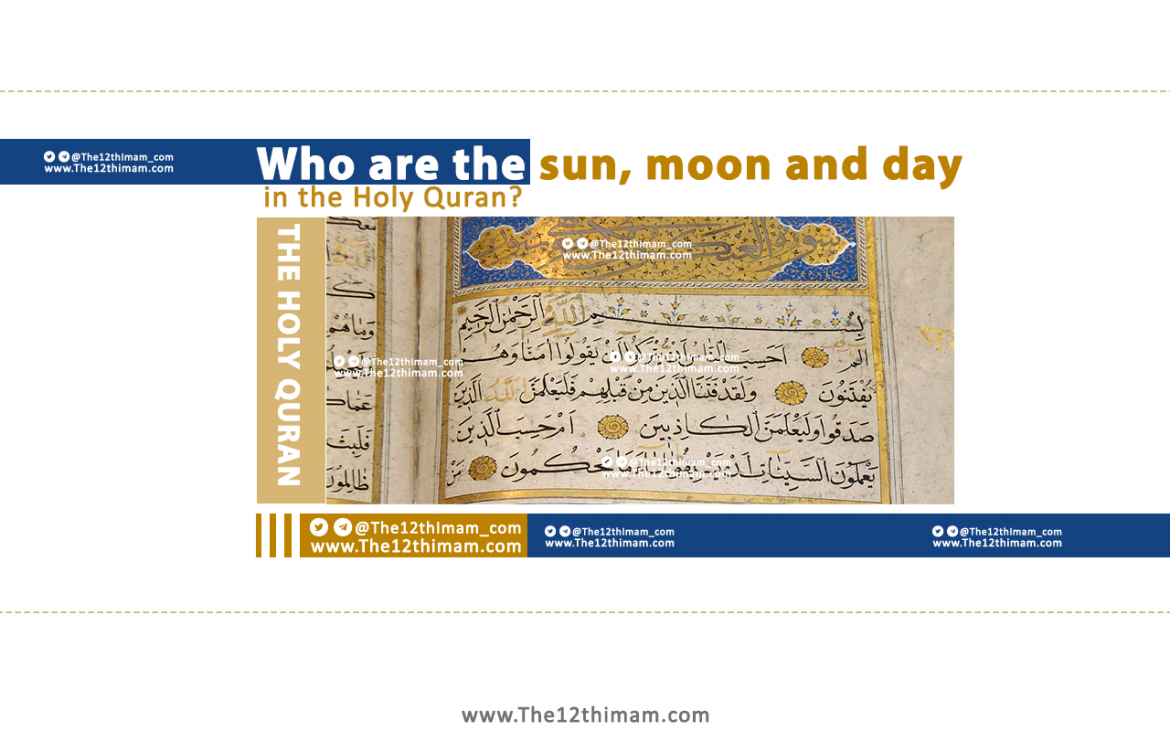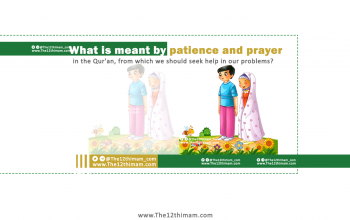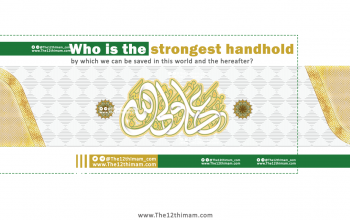In the Holy Quran, we read in Surah Mubarakah Shams
وَ الشَّمْسِ وَ ضُحاها [1]
I swear by the sun and the spread of its light in the morning. (1)
وَ الْقَمَرِ إِذا تَلاها [2]
And to the moon when after that comes out (2)
وَ النَّهارِ إِذا جَلاَّها [3]
And to the day when it reveals the sun.(3)(1)
But what do these verses mean?
In order to make the matter clear, we must first point out that the Holy Qur’an has an external and internal meaning, and also according to some traditions, the Holy Qur’an has 70 themes.
Of course, the number 70 means a large number, which means that the verses of the Qur’an have many meanings, interpretations and according to the traditions, the interpretation of the verses continues until the Day of Resurrection.
In this article, we want to discuss the inner meaning of sun, moon and day in Surah Mubarakah Shams
Harith Aour offered to Imam Hussain (peace be upon him): “l woulddieforyou! O son of the Messenger of God (peace be upon him)! About the verse: “Va shamse va zohaha” said:
“Woe to you, Harith! The meaning of the sun is Muhammad (peace be upon him and his family), and the meaning of the month of Amir al-Mu’minin Ali (peace be upon him) that follows the Prophet (peace be upon him) and the meaning of the day is the Qaim of the family of Muhammad (Ajl Allah Ta’ala Farja Al-Sharif). which fills the earth with justice and justice “. (2)
According to the above hadith, the sun is the Prophet (pbuh) and the moon is Imam Amirul Munin Ali (pbuh), but the important point is that after the Prophet (pbuh) he is the immediate successor of Imam Amirul Munin Ali (pbuh) and the last one is Imam Mahdi (pbuh).
According to various traditions quoted by Shia and Sunni, Imam Amir al-Mu’minin Ali (a.s.) is the successor of the Prophet (s.a.w.).
In some hadiths the word (Vali: it means guardian) is used and in some the word (Khalifa) is used
Among the authentic traditions from Sunni sources that the Prophet (PBUH) said:
: «علی ولیّ کل مؤمن بعدی»؛(3)
Ali (pbuh) is the guardian of every believer after me. 3
«هو ولی کل مؤمن بعدی»؛ (4)
He [Ali] is the guardian of every believer after me. ” 4
«ان علیا ولیکم بعدی(5)
Indeed, Ali is your guardian after me.” 5
«و انت خلیفتی فی کل مؤمن من بعدی»؛(6)
And you (Ali) are my successor among all believers after me. 6
و فهو اولی الناس بکم بعدی».[(7)
So he (Ali) is the most deserving person for you after me. 7
But in another narration, Suleiman Deilami says: I asked Imam Sadiq (peace be upon her) about “val ghamare eza talaha”, the speech of God Almighty.
He said: “Amir al-Mu’minin means Ali (peace be upon him) who came after the Messenger of God (peace be upon him) and that Prophet (peace be upon him) instilled knowledge in him completely (just as the moon gets light from the sun, Ali (peace be upon him) ) acquired knowledge from the Messenger of God (peace and blessings of God be upon him)”. 8
And as for the light of day, it means the same Imam Mahdi, the promised savior, who will appear after a long absence and fill the world with justice.
1) Surah Mubaraka Shams verses 1 and 2 and 3
2) Tafsir Ahl al-Bayt, peace be upon them, Vol. 18, p. 136, Bahar al-Anwar, vol. 24, p. 78/ Bihar al-Anwar, vol. 53/ Firat al-Kufi, p. 563
3) Ibn Shibe, al-Musnaf, 1409 AH, vol. 8, p. 504, h. 58; Nasa’i, Al-Sunan al-Kubari, 1411 AH, vol. 5, p. 132; Handi, Kanzal-Amal, 1409 AH, vol. 13, p. 142.
4) Tayalasi, Mosnad Abi Dawud, Dar al-Marifah, p. 111; Ibn Hanbal, Musnad, Cordoba Foundation, vol. 4, p. 437; Abu Ya’ali Mosuli, Musnad Abi Ya’ali, 1404 AH, p. 293
5) Ibn Kathir, al-Badaiya and al-Nahaiya, 1407 AH, vol.7, p.345; Hindi, Kanzal-Amal, 1409 AH, Vol. 11, P. 612, H. 32963; Ibn Asaker, History of the Medina of Damascus, 1415 AH, vol. 42, p. 191.
6 ) Ibn Abi Asim, Al-Sonnah, 1413 AH, vol.2, p.550; Tabarani, Al-Mu’jam al-Kabir, Darahiya al-Trath al-Arabi, vol. 12, p. 78.
7) Tabarani, Al-Mu’jam al-Kabir, 1404 AH, vol.22, p.135.
8) Commentary on the words of the Ahl al-Bayt Tafsir Ahl al -Bayt, peace be upon them, Vol. 18, p. 134, Al-Kafi, Vol. 8, p. 50 / Bihar al-Anwar, vol. 16, p. 89 / Bihar al-Anwar, vol. 24, p. 73
Sources of content collection:
Al vahy site
Shia wiki site
image:imanoor.com



